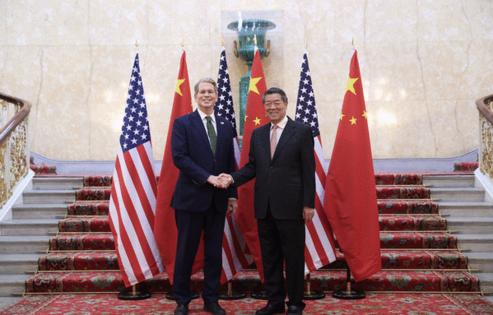US, China negotiators meet in Stockholm to extend trade truce
Published in News & Features
U.S. and Chinese officials are meeting Monday to extend their tariff detente beyond a mid-August deadline, and haggle over other ways to further defuse trade tensions.
Chinese Vice Premier He Lifeng and U.S. Treasury Secretary Scott Bessent will lead the delegations through Tuesday in Stockholm — their third meeting in less than three months. The agenda includes discussions about how long the current tariff truce can be extended, as well as U.S. levies tied to fentanyl trafficking and Chinese purchases of sanctioned Russian and Iranian oil.
The meeting comes as the U.S. races against an Aug. 1 deadline to conclude trade deals with dozens of countries, which should provide more certainty to companies about what levies they’ll face when exporting to the U.S. Talks with Beijing are on a different track with rates for China well above those for other nations, making bilateral trade much more expensive.
Still, Bessent said in recent days that the U.S. would use this week’s huddle to work “out what’s likely an extension” to the current tariff pause, adding: “I think trade is in a very good place with China.”
Any breakthrough could help set the stage for President Donald Trump to meet with his counterpart Xi Jinping, possibly around a major summit later this year in South Korea. The Chinese leader invited Trump — along with first lady Melania Trump — to visit China in a phone call last month, but no timeframe has yet been set.
U.S. Ambassador David Perdue, who arrived in Beijing in May, presented his credentials to Xi on Friday, China’s envoy to the U.S. posted on X.
At the heart of the haggling between the world’s largest economies is Beijing’s stranglehold on rare-earth magnets used to make everything from electric vehicles to high-tech weapons, and Washington’s curbs on cutting-edge chips essential to AI. The battle over export controls has become a critical component of trade talks.
Reducing the 20% fentanyl tariffs Trump imposed due to U.S. claims Chinese companies supply chemicals used to make the illegal drug is also a high priority for Beijing, Eurasia Group analysts wrote in a note last week, citing recent meetings with Ministry of Public Security officials. Ministry officials traveled to the Geneva talks in May and will likely go to Stockholm, the analysts wrote.
While China has denied its responsibility for the flow of the deadly drug, last month it tightened controls over two chemicals that can be used to make the opioid. Earlier this month, Trump praised those moves. “China has been helping out,” he told reporters. “We’re talking to them and they’re making big steps.”
For the U.S., the recent Chinese actions aren’t enough, as such moves were required to comply with United Nations measures, according to a person familiar with the trade talks. Chances of reducing the 20% tariff in this round of talks are very slim, added the person who asked not to be identified discussing sensitive matters, while noting everything could change on Trump’s whim.
China would be willing to cooperate more on fentanyl, said Sun Chenghao, a professor at Tsinghua University in Beijing. But the U.S. would have to remove the related tariffs, stop blaming Beijing for what it sees as a U.S. domestic problem and provide concrete evidence of crimes, he said.
The U.S. business community remains hopeful for progress, with Sean Stein, president of the U.S.-China Business Council, telling Bloomberg TV that movement on fentanyl presents the “biggest opportunity” in talks.
“That then lowers tariffs on the U.S. side, which then opens the door for China to lower tariffs that lets us sell agriculture, lets us sell airplanes, lets us sell automobiles, that let’s us sell energy,” he said.
Oil Purchases
In his comments announcing the talks, Bessent indicated negotiations can now take on a broader array of topics, potentially including Beijing’s continued purchases of sanctioned oil from Russia and Iran.
Chinese state media has already pushed back against that idea. “China won’t play along” with such attempts to use China to kill Russia’s economy, Lv Xiang, a U.S. expert with the Chinese Academy of Social Sciences last week told the state-run tabloid Global Times.
By contrast, China’s imports of three major energy products from the U.S. hit almost zero in June, marking the first time in almost three years the Asian nation didn’t import any crude oil from its top rival. Deliveries of American crude oil, liquefied natural gas and coal have been subject to Chinese tariffs of 10% to 15% since February.
Xi’s government has begun rolling back some of its other retaliatory measures since the two sides met last month in London. Crucially, Beijing has boosted shipments of rare earth magnets, while the U.S. relaxed restrictions on sales of less-advanced semiconductors to China.
In another potential goodwill gesture, as the Sweden talks were announced this month, China revealed it had suspended an antitrust investigation into the local unit of U.S. chemical manufacturer DuPont de Nemours Inc.
China’s colossal manufacturing output will also be a talking point for Trump’s team.
Bessent said the U.S. hopes to see China “pull back on some of this glut of manufacturing that they’re doing and concentrate on building a consumer economy.”
____
(With assistance from Colum Murphy and Fran Wang.)
©2025 Bloomberg L.P. Visit bloomberg.com. Distributed by Tribune Content Agency, LLC.







Comments